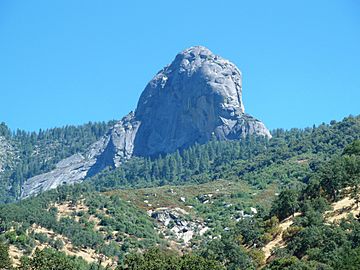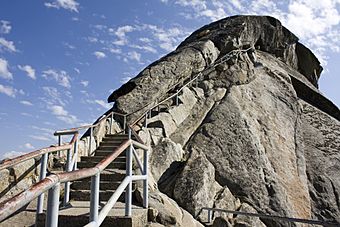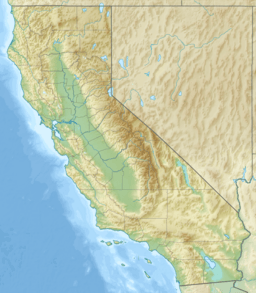Moro Rock facts for kids
Quick facts for kids Moro Rock |
|
|---|---|

View of Moro Rock from Potwisha (near Hospital Rock), Sequoia National Park
|
|
| Highest point | |
| Elevation | 6,725 ft (2,050 m) |
| Prominence | 245 ft (75 m) |
| Geography | |
| Parent range | Sierra Nevada |
| Topo map | USGS Giant Forest |
| Geology | |
| Age of rock | Cretaceous |
| Mountain type | Granite dome |
| Climbing | |
| First ascent | 1861, by Hale Tharp, John Swanson and George Swanson |
| Easiest route | Hike |
Moro Rock is a huge rock formation located in Sequoia National Park, California. It is a type of rock called a granite dome. You can find it in the middle of the park, between the Giant Forest and Crescent Meadow.
A special stairway was built on the rock in 1931. This stairway allows visitors to hike all the way to the top. From the summit, you can see a large part of the park, including the Great Western Divide. It's important to be safe: do not use the trail during thunderstorms or when it is snowing.
Contents
Exploring Moro Rock
The road leading to Moro Rock is closed during winter. This means visitors need to hike about 2 miles to reach the viewpoint. In the summer, the road is open, making the hike much shorter.
Since 2012, the road is open to cars only on weekdays. On weekends, a shuttle bus runs, and cars are not allowed on the road. This helps manage traffic and protect the park.
Rock Climbing at Moro Rock
The west side of Moro Rock is popular for rock climbing. It has many cracks and knobs, perfect for climbers. However, climbing is not allowed on the south and east sides of the rock during the peregrine falcon nesting season. This rule helps protect these amazing birds while they raise their young.
How Moro Rock Was Formed
Moro Rock is a giant, rounded rock made of granite. It's called a monolith because it's one single piece of rock. Many similar dome-shaped rocks are found in the Sierra Nevada mountains.
These domes form through a process called exfoliation. This is when layers of rock peel off, like an onion. Imagine the granite was once buried deep underground. Over time, the rock above it wore away. When the weight of the top layers was removed, the granite slowly expanded. This expansion causes cracks to form in rounded shapes, creating the dome-like look of Moro Rock.
The Moro Rock Stairway
|
Moro Rock Stairway
|
|
 |
|
| Built | 1931 |
|---|---|
| Architect | National Park Service |
| NRHP reference No. | 78000283 |
| Added to NRHP | December 29, 1978 |
The very first stairway to the top of Moro Rock was made of wood in 1917. After about ten years, it started to fall apart. So, in 1931, a new stairway was built. This new stairway was created by the Civilian Conservation Corps, a group that helped build many parks and trails.
The new stairway was designed to blend in with the natural rock. It was planned by National Park Service experts Merel S. Sager and John Diehl. They made sure it followed the natural ledges and cracks in the rock. The stairway is 797 feet long and has about 400 steps. It leads visitors right to the summit of Moro Rock.
 | Lonnie Johnson |
 | Granville Woods |
 | Lewis Howard Latimer |
 | James West |



